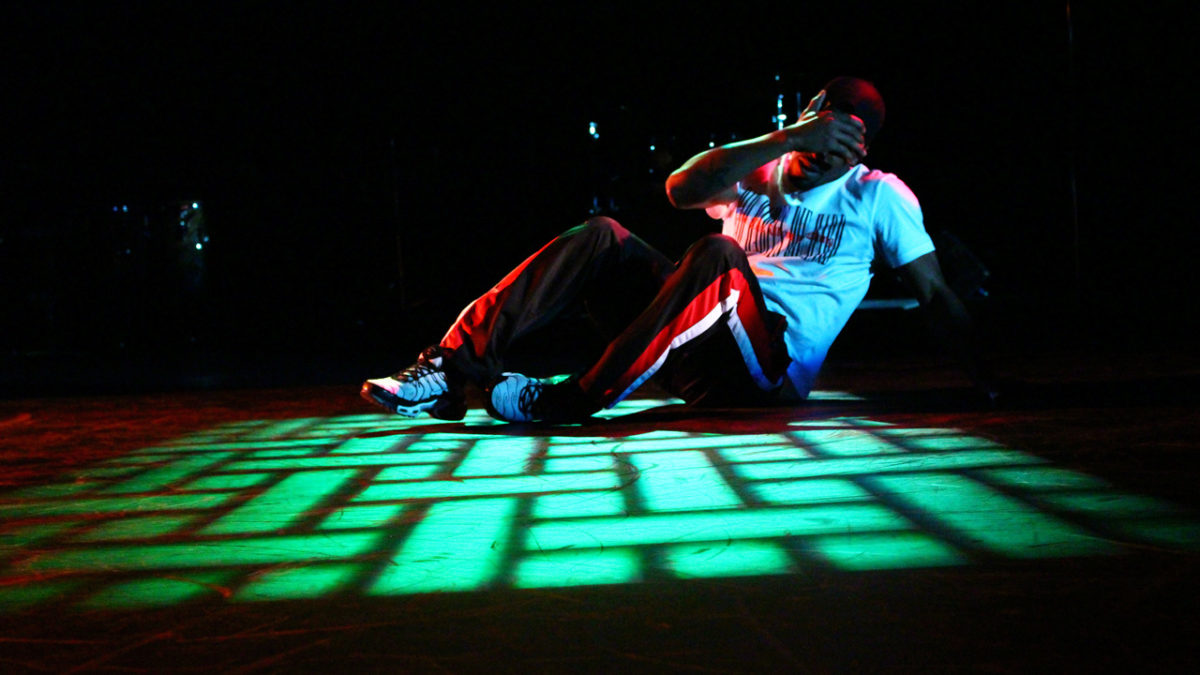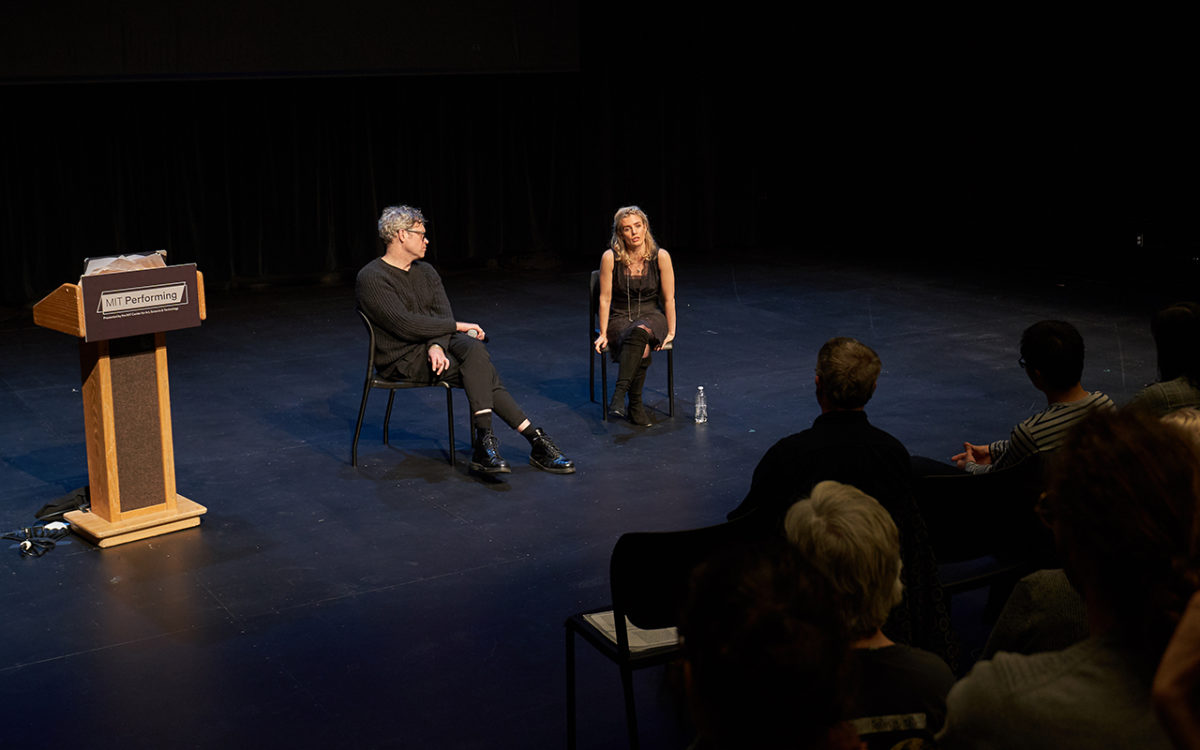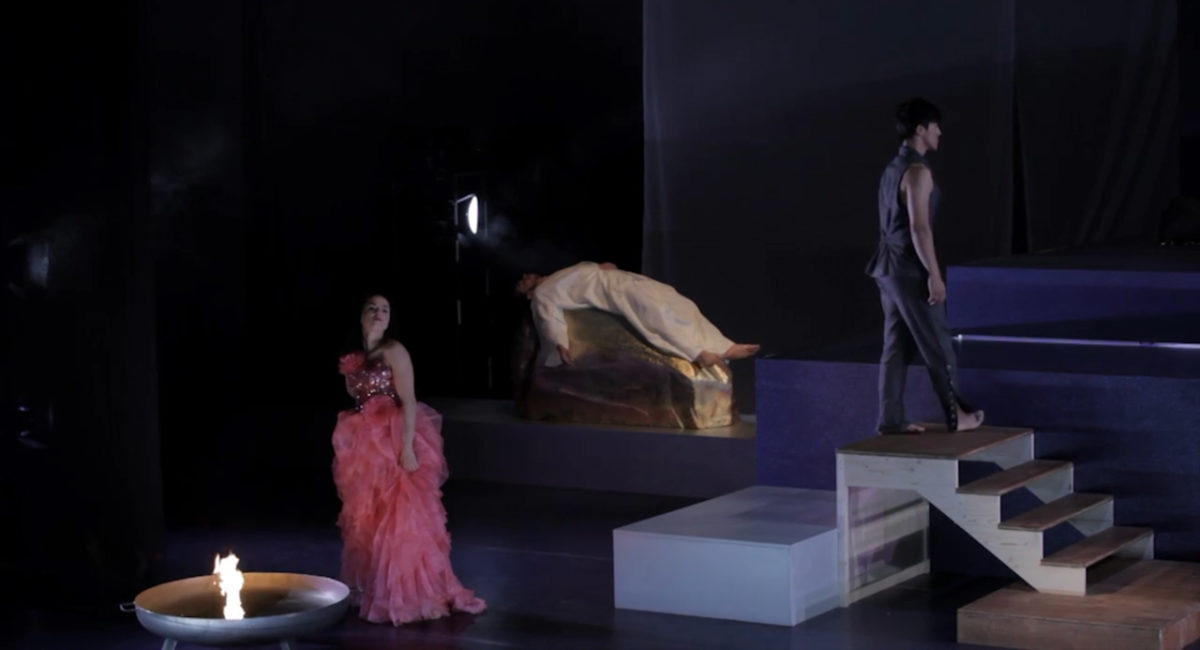The season highlights personal and collective storytelling in performance.
The powerful trifecta of live cinema, dance theater, and social music informs the 2019-20 MIT Performing series through an inspiring season of lectures, prototypes, research residencies and performances, curated by Jay Scheib, Professor for Theater Arts at MIT.
Now in its second year, this season of MIT Performing features a richly-layered series of collaborations, workshops, and community-discussion-dance-parties.
Opening the season, choreographer McKersin ignites an otherwise typical block party to reveal the soaring personal narratives that bind its performers to their communities and to the identities they perform. Choreographer Constanza Macras follows, in a residency that seeks to upend the social assumptions that often inform our urban spaces through a series of master classes and talks leading to a performance next year. In December, director Scheib develops a new live cinema exchange with the works of Swedish filmmaker, Ingmar Bergman. And in the spring, acclaimed Beckett actress Lisa Dwan returns to begin a collaborative that will migrate her storied stage performance of Beckett’s Not I to another platform, that of a gallery installation.
Finishing the season, conceptual dance luminary Lucinda Childs, legendary performer and Associate Artistic Director of New York City Ballet Wendy Wehlan, and acclaimed musician, producer, performing artist and cellist Maya Beiser join Sara Brown, scenic designer and assistant professor for Theater Arts, to discuss their artistic collaboration on The Day.
Lakaï Dance Theatre Presents The Block
The season launches in September with the premiere of The Block: An Afro-Musical, McKersin’s interdisciplinary performance with Lakaï Dance Theatre (LDT). A vibrant, conceptual mix of music, personal narrative, and Afro-diasporic dance styles, The Block draws on topics often deemed culturally taboo in Hatian communities. Topics such as mental health and homosexuality remain unspoken but also vividly central to the everyday lives of those from the blocks (neighborhoods). “Many of us would rather sweep these issues under the rug, in our constant battle for survival,” says company director and choreographer McKersin.
Lakaï, which means “home” in Haitian Creole, refers to a larger cultural experience for the director. “The idea of home is sacred. Sadly, if your home environment isn’t safe, or feels unsafe, it will lead to all sorts of problems. A home can become a toxic breeding ground.” LDT explores those circumstances, while offering a healing experience for its performers. “I realized that many issues stem from a toxic home. I want my company to be a safe home environment for all those who pass through.”
McKersin’s troupe has an affinity for hip hop, jazz and Afro-Diasporic styles, as well as first-hand knowledge of the intricate rhythms and vernacular of Haitian language and culture. Their experiences inform The Block—shaping its narrative and musical score. “Sometimes I would say, ‘Hey, do it like this,’” recalls the choreographer, “and they would tell me, ‘Nobody says or does it like that where I’m from!’”
The Block will be presented in W97, MIT’s new performing arts facility, where it was developed through a rehearsal residency this past spring. “I was able to think freely, without limit,” says McKersin of the experience. Ultimately, he says, The Block is a conversation that will keep evolving. “I want people to experience our culture, without any translation. The after party will continue the piece, wherever we perform it. We’ll also include local artists in pre- and post-show events.”
Courtesy of Lakaï Dance Theatre.
Constanza Macras Creates Collaborative Theater
Award-winning dance theater maker Constanza Macras brings her collaborative choreographic practice to MIT this fall. Drawing from documentary forms, community engagement, and biography-driven performance techniques, Macras will collaborate with Kurt Fendt, Senior Lecturer in Comparative Media Studies/Writing and Director of the MIT HyperStudio, in developing a collaboration across disciplinary boundaries with MIT Students, faculty, staff, and members of the greater Cambridge dance community.
Originally from Buenos Aires, Argentina, Macras danced in New York City and Berlin, where she founded her celebrated company, Dorky Park, in 1997. As she has with dance companies around the globe, Macras will collaborate with the MIT community as co-creators and performers in a residency that includes a lecture this fall, followed by a work-in-progress performance as part of the 2020-21 MIT Performing series.
Jay Scheib Reinterprets The Silence
Ingmar Bergman’s films are a master class of human emotion, laid bare. Their visceral intensity has inspired MIT CAST Mellon Faculty Fellow and Professor of Theater Jay Scheib to reinterpret the Swedish director’s cinematic language.
Scheib’s operatic adaptation of Bergman’s 1966 film, Persona, composed by Keeril Makan, was presented as part of the 2015-16 season of MIT Sounding, followed by its premiere at National Sawdust in New York City. For this year’s MIT Performing series, Scheib turns to another Bergman classic, The Silence, tuning its tense physicality and terse foreboding dialogue to a new live cinema, multiplatform performance. Jay Scheib’s The Silence assembles an ensemble of professional actors, designers, filmmakers and students who will develop and present the work in December in MIT Building W97.
Maya Beiser and Wendy Whelan Discuss The Day
Described as a sensory exploration of life and the eternal, The Day is a collaboration between distinguished artists, set to a score by Pulitzer Prize-winning composer David Lang. The creative team includes cellist and 2016-18 Mellon Distinguished Visiting Artist Maya Beiser, Associate Artistic Director (and former principal dancer) of the New York City Ballet Wendy Whelan, iconic post-modern choreographer Lucinda Childs, prolific scenic designer and MIT Music and Theater Arts assistant professor Sara Brown, and projection designer and MIT lecturer Joshua Higgason. The piece received a work-in-progress showing at the Institute of Contemporary Art in Boston this past summer before premiering at Jacob’s Pillow; it will return to the ICA in spring 2020.
In conjunction with the performance at the ICA/Boston, Brown will join Beiser and Whelan in a public conversation about their approach to creating this bold and highly collaborative work through the shared languages of music, dance, and design in MIT Building W97.
Beckett Specialist Lisa Dwan Returns
One highlight of the inaugural 2018-19 MIT Performing season was Irish actress, producer and director Lisa Dwan. Her lecture/demonstration, “A Body of Beckett,” vividly demonstrated the mental fortitude and physical stamina required of the Irish Bard’s solo works.
As the 2019–20 CAST Mellon Distinguished Visiting Artist, Dwan returns to work with faculty members from the MIT Media Lab, Literature, and Theater Arts. Together, they will cull the raw and essential elements found at the intersection of text, live performance, and technology. In a collaboration that engages 4D artists and engineers, Dwan will migrate her critically-lauded live stage performance of Beckett’s Not I to another platform—that of the gallery installation.



